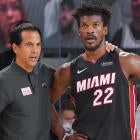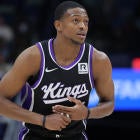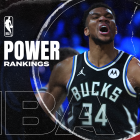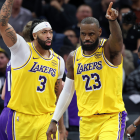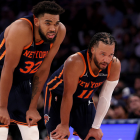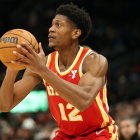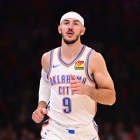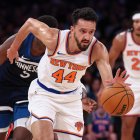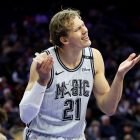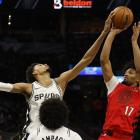
The Indianapolis Colts used to be extremely stingy with their practice reps. Peyton Manning hogged every snap, and when Jon Gruden asked former Colts offensive coordinator Tom Moore why that was, Moore famously replied "If No. 18 goes down, we're f-----d, and we don't practice f----d."
The Miami Heat are arguably the best-prepared team in basketball. Erik Spoelstra just dispatched perennial Coach of the Year candidate Brad Stevens in the Eastern Conference finals, and a round prior, he coached circles around Mike Budenholzer, a two-time COY winner. The Heat are the first No. 5 seed ever to reach the Finals, and that's no accident. As the playoffs proved, their roster is equipped to handle almost any kind of opponent. But like the Colts, the Heat almost certainly haven't practiced "f----d." With both Goran Dragic and Bam Adebayo doubtful for Game 2 of the Finals with injuries, that is almost certainly what they are.
Almost is the keyword there. Upsets in sports, even at the championship level, are hardly unheard of, and it's worth noting that neither Dragic nor Adebayo has been ruled out for the series or even Game 2. The longer this series goes, the stronger the Heat are likely to become. They don't have to win the championship in Game 2. They have to survive long enough to give themselves a chance to do so later. Doing so is going to mean embracing tactics they'd never dream of at full strength, and that are so aggressive that the Lakers can't possibly be prepared for them.
In 2009, Malcolm Gladwell presented the concept of "David" strategies, a methodology underdogs have historically used to take down figurative Goliaths. Whether in war or sports, the idea is simple: David beat Goliath with a slingshot, not a sword. If an underdog tries to beat a favorite at its own game, it is going to lose because the favorite is the favorite specifically because of how good it is at playing its own game. The key to winning lies in finding strategies so unique and extreme that, even if they carry enormous amounts of risk, the reward becomes high enough to topple a giant.
What are those strategies in basketball? It's not quite an exact science, but there are a few general principles that tend to engender upsets. In no particular order, these three principles tend to exist at the core of basketball's biggest.
1. Fire away from behind the arc
The Kevin Durant version of the Golden State Warriors were, without question, the most talented NBA team ever built. Even LeBron James at his absolute apex was only able to take one playoff game out of nine off of them. No team in the 2017 Western Conference could even claim that. But one team consistently gave the Warriors fits: the Houston Rockets. The Rockets won as many playoff games against the Durant-led Warriors as the rest of the NBA combined (assuming you don't count the 11 minutes he played in Game 5 of the 2019 Finals). Many of their tactics were irreplicable. Most underdogs don't have James Harden. But there is one advantage every underdog can give itself: math.
Houston has led the NBA in 3-point attempts in six of the past seven seasons. The Rockets attempted 7.4 more 3-pointers per game than the Warriors in the 2018 Western Conference finals, an advantage that ballooned to 10 in their 2019 rematch. It should surprise nobody literate enough to read this story to hear that three is a bigger number than two.
That offers no guarantees. Those shots are worth more because they're harder to make. Take enough of them, and you might go 0 for 27. But if that happens, you get the expected outcome. A loss is a loss. But make 13 of those 27? Now you've introduced enough variance into the conversation to take down a favorite. High-risk, high-reward.
When UMBC became the first No. 16 seed to beat a No. 1 in the NCAA Tournament, it took two more 3-pointers than Virginia, but it made eight more. That upset, in large part, was predicated on getting hot from behind the arc. The Heat are better equipped to do that than any team in the NBA. They finished second in the league in 3-point percentage during the regular season, and Adebayo's likely replacements, Kelly Olynyk and Meyers Leonard, are both significantly better shooters than he is.
But in Game 1 of the Finals, the Heat somehow took fewer 3-pointers than a Lakers team that finished 23rd in long-range attempts this season. The Heat, by contrast were ninth, but they played Game 1 as if they were a favorite, taking the 2-pointers the Lakers were willing to give them instead of forcing the issue from behind the arc as an underdog should. If they plan to win Game 2, they'll need to. They don't have the talent to keep up with the Lakers, but they can make up the gap with math.
2. Run down the clock
Just as underdogs seek to introduce variance, favorites want to decrease it. Look at it this way: If a favorite played an underdog in a 999-game series, it would almost certainly win because, over a long enough sample, its superior talent is almost always going to win out. But in a single game? Almost anything is possible.
Obviously, the Heat can't petition for the Finals to be changed to a single-elimination format (they'd have already lost if that was the case). But they can simulate the variance of a shorter series by literally shortening the game. Even if the exact value is incalculable, we can logically say that a favorite's superiority is worth a certain amount of points per possession. If an underdog manages to limit the total number of possessions in a game, it limits the value of that superiority.
This is a strategy LeBron knows quite well. The 2015 NBA Finals was a masterclass on this subject. The Warriors were the NBA's fastest regular-season team, clocking in at just under 99.3 possessions per game. The Cavaliers played most of the Finals without Kyrie Irving and Kevin Love, and doing so at Golden State's pace would have been disastrous. So LeBron did the only thing he could do. He waited, draining the shot clock as much as possible with each trip down the court, limiting the number of possessions in each game and summarily increasing their variance. The six Finals matchups averaged only 93 possessions per game.
On paper, that lopped off something like 6.5 percent of Golden State's advantage, but in truth, it did quite a bit more. It took the Warriors out of their rhythm and limited their easy points through transition. The Lakers absolutely rely on those points. They have the NBA's second-most efficient transition offense, but are 19th in the halfcourt.
Miami doesn't have the personnel to do it Cleveland's way. The Cavaliers extended their own possessions through incredible and unsustainable offensive rebounding. The Heat have to milk as much time off of their own possessions as possible, but accept that offensive rebounding given their lack of size isn't a reasonable priority. Instead, they can suffocate the Lakers' transition attack by dedicating themselves to getting back on defense. Without fast breaks, the Lakers will have to waste more of the clock themselves. Even compromised by injuries, the Heat have a chance if this series is slow enough.
3. Trap, press and zone
The vaunted Heat zone was one of the biggest reasons Miami reached the NBA Finals in the first place. The Heat used zones on 11.6 percent of their defensive possessions this season. No other team reached seven percent. In the Eastern Conference finals against Boston, the Heat used their zone defense on 177 different possessions. In Game 1 of the Finals? They used it twice.
There's good reason for that on paper. The Heat tried their zone against the Lakers in November. On 32 possessions, the Lakers scored 32 points. In their December rematch, the Heat used zones just eight times. For all of its benefits, one of the biggest weaknesses of a 2-3 zone is the hole it leaves in the middle of the floor, where Anthony Davis likes to operate.
And if Anthony Davis beats you there? So be it. He's Anthony Davis, and he does that to almost everybody. But some degree of variance is almost certainly coming for his jumper. He's made 50 percent of his mid-range shots this postseason. Dirk Nowitzki made 49 percent during his legendary 2011 run to a championship. Davis isn't Dirk. During the regular season, he made only 34.9 percent of those attempts.
The tradeoff to that gap in the middle is stout protection at the basket, where the overwhelming majority of Laker shots come. Zone defenses take away those shots and offer 3-pointers in their place. Unlike the Heat, the Lakers have little interest in turning this series into a shootout. During the regular season, they went 13-9 in games in which they attempted 35 or more 3-pointers. They finished only 18th in the NBA in hitting 37.7 percent of their 3-pointers. If the Heat can use their zone to manipulate the Lakers' shot-selection, that is a win. But with Bam out, it almost certainly won't be enough to stop the Lakers indefinitely. LeBron will figure out the Bam-less zone quickly, so the Heat need to vary their looks. Ideally, they'll lean on more high-variance tactics to try to generate turnovers.
Trapping James off screens is an option, especially when Davis is sitting. The Heat know firsthand how risky this can be. Boston tried this strategy against them and it backfired. Badly.
This is the pick-and-roll defense I genuinely don't understand. Jimmy Butler isn't Stephen Curry. You don't have to blitz to prevent the 3. Bam is one of the best passing bigs on the planet. Andre Iguodala is in the dunker's spot. This was either a guaranteed dunk or wide open 3. pic.twitter.com/2AjNtDKpsv
— Samuel H. Quinn (@SamQuinnCBS) September 24, 2020
That's a great shot when Dragic is the shooter. The Lakers don't have many shooters like Dragic. If the low man can successfully take away the dunk, the Heat can use this tactic to force the Lakers into 3s, even if they're valuable ones. Again, we're talking high-risk, high-reward here. All things considered, the Heat are probably happier with the ball in Kentavious Caldwell-Pope's hands than LeBron's.
The logical extreme on this front is a full-court press. The Heat did that on only 77 possessions this season, 11th-fewest in the NBA, and the numbers were ugly when they deployed it. Use against LeBron would be ill-advised, but backup units featuring Alex Caruso and Rajon Rondo as primary ball-handlers would be vulnerable. This does not help in the effort to slow the game down, but as Gladwell describes in his initial story on "David" strategies, historically speaking, pressing is an invaluable tool. In this setting, it should be just that: a tool. A changeup to throw the Lakers off for brief stretches.
That is all Miami can really hope to do right now. No matter what the Heat try, they are probably going to lose this series, and lose it badly. Extreme strategies probably won't change that. They may also lead to embarrassing blowouts. But 40-point losses don't count for extra. Given their depleted depth chart, the Heat don't really have a choice. If they try to think like the Lakers, they'll lose like the Lakers.
But if they think like the underdog they are? They might just be able to extend this series long enough to get their best players back, and once that happens, anything is possible.









